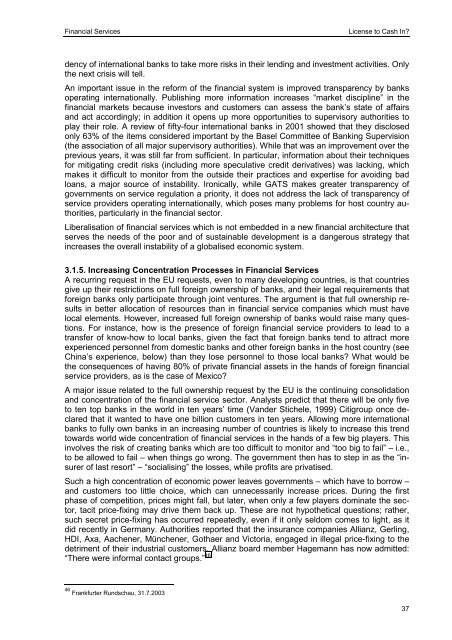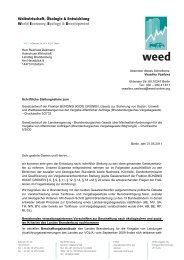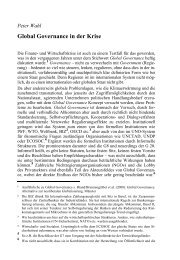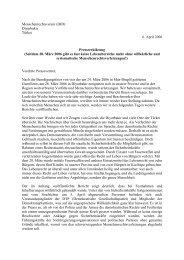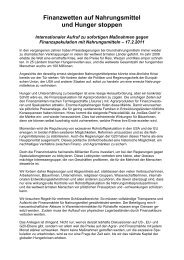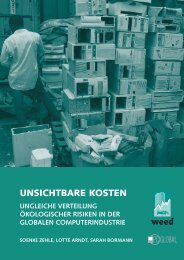LICENSE TO CASH IN? - Weed
LICENSE TO CASH IN? - Weed
LICENSE TO CASH IN? - Weed
- No tags were found...
You also want an ePaper? Increase the reach of your titles
YUMPU automatically turns print PDFs into web optimized ePapers that Google loves.
Financial ServicesLicense to Cash In?dency of international banks to take more risks in their lending and investment activities. Onlythe next crisis will tell.An important issue in the reform of the financial system is improved transparency by banksoperating internationally. Publishing more information increases “market discipline” in thefinancial markets because investors and customers can assess the bank’s state of affairsand act accordingly; in addition it opens up more opportunities to supervisory authorities toplay their role. A review of fifty-four international banks in 2001 showed that they disclosedonly 63% of the items considered important by the Basel Committee of Banking Supervision(the association of all major supervisory authorities). While that was an improvement over theprevious years, it was still far from sufficient. In particular, information about their techniquesfor mitigating credit risks (including more speculative credit derivatives) was lacking, whichmakes it difficult to monitor from the outside their practices and expertise for avoiding badloans, a major source of instability. Ironically, while GATS makes greater transparency ofgovernments on service regulation a priority, it does not address the lack of transparency ofservice providers operating internationally, which poses many problems for host country authorities,particularly in the financial sector.Liberalisation of financial services which is not embedded in a new financial architecture thatserves the needs of the poor and of sustainable development is a dangerous strategy thatincreases the overall instability of a globalised economic system.3.1.5. Increasing Concentration Processes in Financial ServicesA recurring request in the EU requests, even to many developing countries, is that countriesgive up their restrictions on full foreign ownership of banks, and their legal requirements thatforeign banks only participate through joint ventures. The argument is that full ownership resultsin better allocation of resources than in financial service companies which must havelocal elements. However, increased full foreign ownership of banks would raise many questions.For instance, how is the presence of foreign financial service providers to lead to atransfer of know-how to local banks, given the fact that foreign banks tend to attract moreexperienced personnel from domestic banks and other foreign banks in the host country (seeChina’s experience, below) than they lose personnel to those local banks? What would bethe consequences of having 80% of private financial assets in the hands of foreign financialservice providers, as is the case of Mexico?A major issue related to the full ownership request by the EU is the continuing consolidationand concentration of the financial service sector. Analysts predict that there will be only fiveto ten top banks in the world in ten years’ time (Vander Stichele, 1999) Citigroup once declaredthat it wanted to have one billion customers in ten years. Allowing more internationalbanks to fully own banks in an increasing number of countries is likely to increase this trendtowards world wide concentration of financial services in the hands of a few big players. Thisinvolves the risk of creating banks which are too difficult to monitor and “too big to fail” – i.e.,to be allowed to fail – when things go wrong. The government then has to step in as the “insurerof last resort” – “socialising” the losses, while profits are privatised.Such a high concentration of economic power leaves governments – which have to borrow –and customers too little choice, which can unnecessarily increase prices. During the firstphase of competition, prices might fall, but later, when only a few players dominate the sector,tacit price-fixing may drive them back up. These are not hypothetical questions; rather,such secret price-fixing has occurred repeatedly, even if it only seldom comes to light, as itdid recently in Germany. Authorities reported that the insurance companies Allianz, Gerling,HDI, Axa, Aachener, Münchener, Gothaer and Victoria, engaged in illegal price-fixing to thedetriment of their industrial customers. Allianz board member Hagemann has now admitted:“There were informal contact groups.” 4646 Frankfurter Rundschau, 31.7.200337


